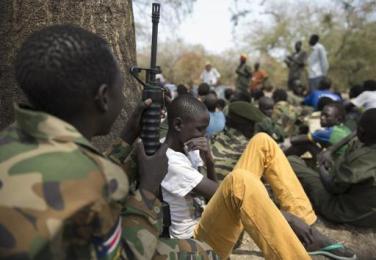Upper Nile governor denies reports government-allied militia abducted children
February 23, 2015 (JUBA) – The governor South Sudan’s Upper Nile state has denied reports that some school-aged children had been abducted and forcibly conscripted into the military.

The area is under the control of a government-allied militia group under the command of Major General Johnson Ulony, a member of the Shiluk tribe and a former militia groups that agreed to lay down their weapons in response to a presidential amnesty in 2012.
Governor Simon Kun Puoc claimed the reports were part of a campaign designed to mislead the public and tarnish the image of the South Sudanese army (SPLA).
“We know this, but the truth is that there is nothing like that. The SPLA as a national army has a clear policy which prohibits the recruitment and use of children in the armed conflict,” he told Sudan Tribune during an exclusive interview on Monday.
In a statement, the UN Children’s Fund (UNICEF), which operates in the state, put the number of abducted children at least 89 boys, some of whom are believed to be as young as 13.
UNICEF said the children were abducted during house-to-house searches by members of the militia group in Malakal.
Malakal, which is currently under government control, has changed hands several times during the conflict between South Sudan’s rival warring parties and has recently been the scene of intense fighting between rebel forces and government troops.
Human rights organisations and several civil and children’s rights activists have accused warring factions of recruiting and using child soldiers to bolster their ranks.
However, South Sudanese government officials at both state and national levels have strongly denied the allegations, describing them as baseless, although the area in which the abductions occurred remains firmly under its control. The country’s rebel faction has yet to respond to the charges.
UNICEF reports that at least 12,000 children were conscripted as soldiers in 2013 and 2014 by the country’s armed forces and various other groups involved in the conflict in South Sudan.
“For every child released, it’s the chance for a new life,” UNICEF’s South Sudan representative, Johnathan Veitch, said in a statement. “We are witnessing the negative consequences that being in an armed group has had on the boys. Some are withdrawn while others exhibit violent and aggressive behaviour. Instead of playing, they march up and down,” he added.
The abductors, according to multiple eye accounts confirming reports of their parents, surrounded area inhabited predominantly members of Shilluk community and searched house to house and took the children by force.
“The recruitment and use of children by armed forces destroys families and communities,” said Veitch. “Children are exposed to incomprehensible levels of violence. They lose their families and their chance to go to school,” he added.
Analysts with considerable knowledge of the area and factors influencing the unfolding of events say the move initially planned by the government-allied militia group in the area was intended to recruit the “idle youth” in the community to bolster the ranks of the armed forces to fight alongside government troops as home guards against rebel fighters
“There is a force recruitment going on in Shilluk area. It was planned for idle youth and it is unfortunate that children have fallen victims. The essence of this recruitment is to bolster the rank of the army as part of counterinsurgency strategy by arming the local people and let them defend themselves and their properties in the situation where regular forces are overstretched”, a security analyst said on Monday.
(ST)
